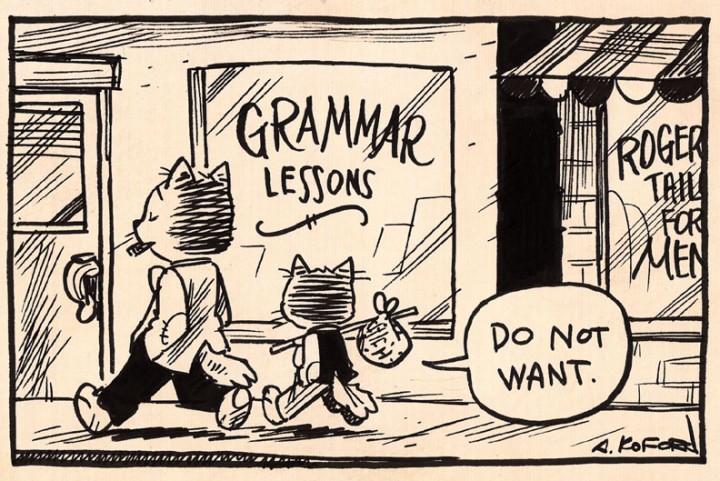
Today’s post was written by Brett Slater, Chief Social Media Officer at The Latimer Group.
As you may know from my last post, I also do morning radio in my home state of Maine. Phone calls from listeners are a big part of our show every morning, and the topics vary widely, from local politics (rarely) to Miracle Whip vs. mayonnaise (mayo all the way) to which way the toilet paper should come off the roll (over).
Recently, the topic was “words or phrases people use incorrectly.” It’s a huge pet peeve of mine, anyway, but what I found most interesting was how many people also said it was one of theirs, and yet, how widespread the problem seems to be. You hear and see these “grammar fouls” everywhere, from Facebook friends to coworkers… You even hear TV news anchors getting them wrong. A few select favorites our callers shared with us:
• When you’re talking about two things that don’t go together, say that the two ideas don’t “jibe,” not “jive.” A jive is a kind of dance. Or a method of Talkin’, if you’re a Bee Gee.
• When a point you’re making is unresolved or vague, it’s a “moot” point, not a “mute” point.
• When you want to say “for all intensive purposes,” stop yourself, and remember it’s “for all intents and purposes.”
• That double-shot of wake-me-up in the morning is “espresso,” not “expresso.”
• Similarly, at the end of an open ended list, say, “et cetera,” not “excetera.”
I’m pausing a moment to cringe. It’s driving me crazy to even write these.
• If you have an idea you’d like to explore more deeply, “flesh it out.” If you’re hunting a partridge and he’s gone into a bush, that’s when you “flush it out.”
• It’s not “should of.” It’s “should have.” As in, “I should have paid more attention in English class.”
• The word “nuclear.” It’s “noo-klee-ur,” if you please. Not “noo-kyoo-ler.” I don’t care how often President Bush said it. He was wrong every single time.
I could go on and on with examples, and there are plenty of articles online that mention them as well. But I mention them here because The Latimer Group is all about powerful and clear communication. And when you misuse language in this way, you sound anything but powerful and clear. You sound uninformed and unprepared.
I think the above examples come from too much time spent on only one side of the communication equation – too much “waiting to talk.” The attitude almost seems to be, “I don’t care if I’m saying it wrong, I just need to be HEARD!” There’s not nearly enough time spent on the other side of the communication equation. The listening side. The reading, research, and preparation side.
Want to be more powerful and clear when you communicate? Focus on that side – the listening side.
Then the two sides will jibe.






Great read Brett!
Deep breath, Mr. Slater! LOL No one is perfect. But, I agree that we should strive to use the correct words, and use words correctly. Thanks for this list. I will contribute the following to the list:
Comprise versus Compose – Comprise means to contain or embrace, while compose means to make up. Often “comprise” is misused, such as, “The deal team is comprised of members from all departments
Correct Usage:
The deal team comprises members from all departments.
The deal team is composed of members from all departments.
Affect versus Effect – Affect means to influence, while effect means to impact. Examples:
The disruption did not affect the flow of the meeting.
The candidate had quite an effect on the interviewer.
My pet peeve for using a phrase incorrectly is when people say, “I’m just talking out loud here” instead of THINKING out loud.
Of course you’re talking out loud. I can hear you!
So true. I am one of those that try to get it right. And lose sleep over it when I do not.
Thank you!
The other one that makes me cringe every time I hear it, is “we’re taking a different tact.” No, you’re taking a different “tack” – as in tacking sails to change direction or pick up the wind. Tact is not telling your friends and colleagues that they are mauling the English language.